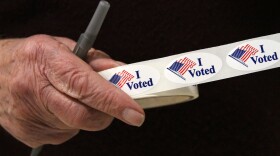The team running the closely-watched audit of election irregularities in Windham's 2020 state representative race put forward a series of proposed reforms to help avoid the same problems in future elections. But the New Hampshire Attorney General and Secretary of State aren't on board with all of those changes.
Find more details on the Windham audit and its findings
Top state election officials say some of the auditors’ suggestions would be too burdensome to implement and others might violate voters’ privacy. They outlined their responses to the audit in this report.
One major disagreement revolves around flagging ballots that can't be properly read by the machines. New Hampshire doesn't have a system to let voters know if their ballot appears to have too many marks on it when it’s fed into a ballot counting machine at the polls on Election Day.
Auditors say enabling this kind of “overvote notification” wouldn’t have prevented the issues in Windham, but it would have identified the problem much sooner.
Through their investigation, auditors determined that Windham’s ballot counting devices miscalculated the vote totals in its state representative race by misinterpreting creases in folded absentee ballots as valid votes.
Those creases intersected with a vote bubble for a Democratic state representative candidate, prompting the machines to erroneously pick up more votes than she actually received.
As a result, the machines erroneously inflated the vote totals for that Democratic candidate. But the same issue also caused the machines to discard hundreds of votes for the Republicans running in the same race because their ballots appeared to have too many votes.
If New Hampshire’s ballot counting devices were programmed to provide overvote notification, it likely would have been possible to discover that something was off about the way the votes were being read at the polls — rather than six months later.
"If [overvote notification] had been in place, this problem probably would have been corrected on Election Day,” says Mark Lindeman, one of the outside auditors who worked on the Windham investigation. “And that would have spared New Hampshire a lot of misery."
But the Attorney General and Secretary of State aren’t convinced this is the right move. They say it would create unequal treatment between voters in machine-count towns and those where ballots are counted by hand. About 40 percent of New Hampshire’s local election wards still rely on hand counts, though they represent a much smaller fraction of the overall votes cast in statewide elections. It could also, they argue, compromise voter privacy.
“The only way an election official could check and see if there was something like an over-count on a ballot is to look at the ballot,” Associate Attorney General Anne Edwards said. “And at that point, you've taken away the secrecy of the ballot, and that causes people to be very concerned.”
Harri Hursti, one of the other auditors who oversaw the Windham investigation, said state officials are entitled to decide which of the recommendations make sense given local regulations and other considerations. But he encouraged New Hampshire officials to explore other alternatives to overvote notification that can still address the underlying concerns exposed by the audit.
“I would say that if you don't enable it, then I would ask to consider some other measure in lieu of that to help to solve these problems,” Hursti said.
New Hampshire officials also rejected auditors’ suggestions to keep more detailed records of ballots, write-in votes, overvotes and undervotes during the recount process. Edwards said this would make it harder to complete recounts in time to meet the deadlines required by state law.
“At some point, there could be some benefit to adding some steps to the recount,” Edwards said, but until then, “we don't see a value to doing that.”
Hursti said it’s important to emphasize that these proposed changes aren’t just meant to improve how elections are conducted, they’re also meant to help election officials establish a paper trail to give the public better confidence in the final outcome.
“The more you have documentation throughout the process, if there is a claim that something is wrong, it makes it easier to document and isolate the exact point when the problem happened or didn't happen,” he said.
The need for more documentation in election systems has become even more critical amid growing attacks on the legitimacy of the voting process.
“From my point of view, we are going to have more claims against the voting system in the future, this is not going to go away,” Hursti said. “One big system design problem of all voting systems is that they are not designed to defend themselves.”
State officials said they do plan to act on several of the auditors' other recommendations, including by studying how a more routine election audit system might be implemented. Overall, though, Edwards said it's important to emphasize that the audit did not uncover systemic problems with New Hampshire elections.
"We're very confident about the system we have in New Hampshire and in the elections as they're run in New Hampshire,” Edwards said. “There's nothing that the audit showed that caused us to be concerned with how the elections are run."








